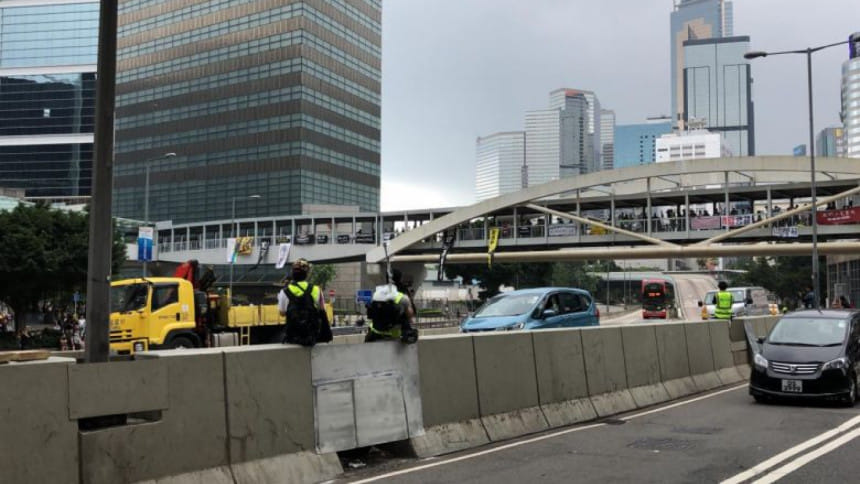Hong Kong police clear streets as protesters move to park

Protesters cleared out of Hong Kong's streets Monday, averting possible clashes with police, but stayed near government headquarters to press their demands that the city's leader resign and abandon an extradition bill that stoked fears of Beijing's expanding control.
The demonstrators took shelter from rain in a covered plaza outside the Legislative Council. Their decision to move there allowed police to reopen streets to traffic.
The activists have rejected an apology from Chief Executive Carrie Lam for her handling of the legislation. Organizers said nearly 2 million Hong Kong residents, young and old, joined a march that lasted late into the night.
"We are very angry that Carrie Lam has not responded to the demands of all the protesters, but now is the time to talk about strategy, and talk about strategy is about how to make the whole struggle into a long-term struggle and not a day struggle, so if Carrie Lam does not respond to the demands by the protesters, people will come back and the struggle will continue," Lee Cheuk-yan, a former legislator and activist, said Monday.
Shortly after daybreak, the police asked for cooperation in clearing the road but said the protesters could stay on the sidewalks. The protesters, many in masks and other gear to guard against possible use of tear gas, argued with police for a time but eventually relented.
The uproar over the extradition bill highlights worries that the former British colony is losing the special autonomous status it was promised when China took control in 1997.
On June 9, a week earlier, as many as 1 million people demonstrated to express their concern over Hong Kong's relations with mainland China.
The scenes have been similar to those nearly five years earlier, when protesters camped for weeks in the streets to protest rules that prevented the direct election of the city's chief executive.
One of the activists arrested after those demonstrations, Joshua Wong, was released from prison on Monday after serving half of a two-month sentence on a contempt charge. He headed to join protesters gathered near Hong Kong's government headquarters soon afterward, and also called in a tweet for Lam to resign and for a halt to "all political persecutions."
The night before, as protesters reached the march's end, thousands gathered outside the city government headquarters and the office of Chief Executive Lam, who on Saturday suspended her effort to force passage of the bill.
Hong Kong residents worry that allowing suspects to be sent for trial in mainland China would be another of many steps chipping away at Hong Kong's freedoms and legal autonomy. One concern is that the law might be used to send critics of Communist Party rule to the mainland to face vague political charges, possible torture and unfair trials.
The protesters are demanding that Lam scrap the proposal for good and that she step down.
Protesters are also angered over the police use of tear gas, rubber bullets and other forceful measures as demonstrators broke through barricades outside the city government's headquarters during demonstrations on Wednesday, and over Lam's decision to call the clashes a riot. That worsens the potential legal consequences for those involved.
In a statement issued late Sunday, Lam noted the demonstrations and said the government "understands that these views have been made out of love and care for Hong Kong."
"The chief executive apologizes to the people of Hong Kong for this and pledges to adopt a most sincere and humble attitude to accept criticisms and make improvements in serving the public," it said.
Not enough, said the pro-democracy activists.
"This is a total insult to and fooling the people who took to the street!" the Civil Human Rights Front said in a statement.
Protesters have mainly focused their anger on Lam, who had little choice but to carry through dictates issued by Beijing, where President Xi Jinping has enforced increasingly authoritarian rule. Some were skeptical that having Lam step down would help.
"It doesn't really matter because the next one would be just as evil," said Kayley Fung, 27.
Many here believe Hong Kong's legal autonomy has been significantly diminished despite Beijing's insistence that it is still honoring its promise, dubbed "one country, two systems," that the territory can retain its own social, legal and political system for 50 years after the handover from Britain in 1997.
After Lam announced she was suspending the legislation to avoid more violence and allow additional debate, Chinese government officials issued multiple statements backing that decision. Lam made clear she was not withdrawing it.
She has sidestepped questions over whether she should quit and also defended how the police dealt with last week's clashes.
Lam insists the extradition legislation is needed if Hong Kong is to uphold justice, meet its international obligations and not become a magnet for fugitives. The proposed bill would expand the scope of criminal suspect transfers to include Taiwan, Macau and mainland China.
So far, China has been excluded from Hong Kong's extradition agreements because of concerns over its judicial independence and human rights record.
Prosecutions of activists, detentions without trial of five Hong Kong book publishers and the illegal seizure in Hong Kong by mainland agents of at least one mainland businessman are among moves in recent years that have unnerved many in the city of 7 million.

 For all latest news, follow The Daily Star's Google News channel.
For all latest news, follow The Daily Star's Google News channel. 



Comments